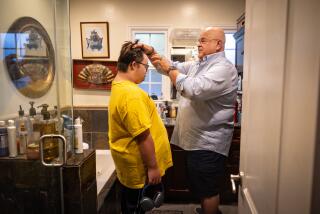Disabled Learn to Live on Their Own
It is just after 1 p.m. and most of the nearly 300 workers in the warehouse-like room are back from lunch and beginning to raise the level of activity to a bright hum.
At tables and workbenches around the room, electrical components are being packaged, posters and artwork are being heat-sealed, envelopes are being stuffed and large potato chip cans are being labeled. The work moves along steadily and efficiently.
They are simple jobs, but the workers, and the process that brought them there, are anything but.
The people manning the tables at the California Elwyn Institute are nearly all developmentally disabled, suffering from neurological conditions and other disabilities that elsewhere might mean a life of dependency where such everyday acts as riding a bus or ordering lunch at a counter would never be learned. Many of them previously have been confined to hospitals, board-and-care homes or other facilities where a sense of independence may not have flourished.
But at the Elwyn Institute, located in an industrial section of Fountain Valley hard by the San Diego Freeway (there is a second, smaller facility in Anaheim), self-sufficiency--learning the simple skills to function both socially and economically in the world--is the goal.
“Their goals are the same as anyone else’s,” said Joan McKinney, the assistant executive director of the institute. “We place some pretty high expectations on our people, and because of that, they start to expect more of themselves.”
Elwyn has been providing that sort of inspiration for more than a century. Since its beginnings in Pennsylvania in 1852 (the Orange County facility has been operating since 1974), Elwyn has been a private vocational training school where the mentally retarded and other developmentally disabled people are trained to help themselves. At both Elwyn facilities in Orange County, “clients” who may not know how to count, read or fathom a bus schedule are taught how to use these and other skills to become more fully independent.
At the Fountain Valley facility, about 75% of the 400 clients work at the facility itself, assembling, collating, preparing bulk mailing, shrink-wrapping, labeling and packaging.
Simple aids are used for those who have trouble counting or distinguishing shapes: small cardboard sections painted with spaces indicating the number and shape of electronic parts to be placed in plastic bags.
In one section of the room, special programs are tailored to meet the needs of those with multiple disabilities--clients who may be both mentally retarded and blind, for instance.
And there is a lunchroom area, the scene of many successes.
Many clients, McKinney said, have had no experience with purchasing their own meals and often are initially bewildered by the concept of receiving food in return for money. She told of one client who initially “was taking food from trash cans or stealing it. If he wanted a cup of coffee, he just took it, even if it belonged to someone else. Now he purchases his own food.”
Joseph Piccari, executive director of the center, recalled a day when he was working in the lunchroom and accepted a client’s money, saying “Thank you, sir.”
“And he looked at me and said, ‘I’m not a sir,’ ” Piccari said. “He wasn’t used to being treated as an adult. When you treat them as adults, it begins creating a level of adult expectation.”
Episodes like that are victories, McKinney said.
“To some people,” she said, “things like this would appear to be very minor, but they’re not. They’re big accomplishments.”
Clients are paid according to their abilities, said Susan DuMontier, a spokeswoman for Elwyn. Their pay is based on the percentage of work they can perform based on the amount of work an average person can do in an hour. For example, if an average person can package 50 circuit testers in an hour at the minimum hourly wage of $4.25, clients are paid $4.25 for every 50 testers they package.
The ultimate goal at the Elwyn Institute, however, is to see a client walk out the door.
“The whole trend now is to de-institutionalization,” DuMontier said. “Our goal is to place them in jobs out in the community. And employers have found out that they do make good employees. They’re a newly tapped resource for a lot of employers.”
Piccari said about 25 clients are placed in outside jobs each year. About 100 of Elwyn’s clients are now in the Orange County work force, DuMontier said.
One of them is Don MacKenney, 42, who for the last two years has worked as a technician at the Dover Shores Pet Care Center in Costa Mesa, a short walk from his residence in a board-and-care home.
“He comes in on time, every weekday at 7 in the morning,” said Scott Hamtil, the center’s manager. “You don’t have to worry about him. He’s our anchor man. He feeds and waters the animals, keeps the cages clean, walks the dogs. Each animal is kind of like a personal friend to him.”
As for MacKenney, he considers his pay of $4.25 an hour “good money.”
“I’m always running around everywhere here, keeping things clean,” he said. “I like it. I do my job as well as anyone can do.”
Which, DuMontier said, is an attitude that indicates yet another victory.
“When they become more independent,” she said, “they feel so much better about themselves. It might appear that their IQs have gone up, but it’s just their attitude. They act differently. These people have come a long way from being called imbeciles.”
More to Read
Sign up for Essential California
The most important California stories and recommendations in your inbox every morning.
You may occasionally receive promotional content from the Los Angeles Times.










